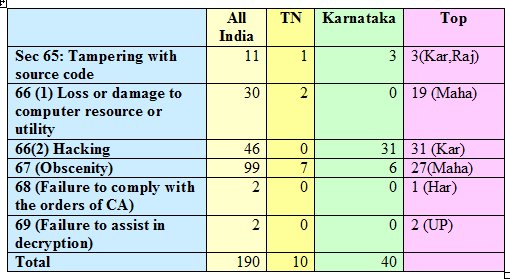Changes in the Cyber Crime Policing- Information Technology Act 2000
Amendment
[P.S: Comments made here in are the first reactions based on the Bill.
Further developments in the form of rules and notifications are awaited..
.Naavi ]
National Crime Records Bureau recently released the 2007 statistics of
Crimes including Cyber Crimes. Media did discuss the report especially
highlighting the growth in Cyber Crimes by 50% as reported. However,
experts have always given scant respect to the recorded Cyber Crime
statistics since this only reflects the cases registered by the Police. It
has no relation to the actual number of Cyber Crimes happening in the
Country as well as complaints taken by public to different Police stations
where they are refused.

One interesting point about NCRB statistics however is that it records
Cyber Crimes under two heads namely "Under ITA 2000" and "under IPC"
recognizing the fact that all crimes committed with the use of Computers
should be recognized as "Cyber Crimes" even though they donot fall under
ITA 2000. This thought is not uniformly followed by Police departments
in different States.
In fact some Cyber Crime Police Stations were happy that they have to deal
with only two sections namely Sections 66 and 67 and occasionally booked
cases under other sections by mistake. The accompanying chart shows that in
2007, out of the 190 cases registered under ITA 2000 on an all India basis,
175 cases were booked under Sections 66 and 67.
In the light of the observations that Cyber Crimes are on the increase,
there was great interest in knowing how the ITA 2000 amendments would
address the issue.
Number of Offences to be monitored has increased
The amendments have now revealed a whole bundle of surprises which will
make Cyber Crime Police in each state jump up from their seats.
Firstly, there is an addition of several new offences into the Act. Section
66 has now been expanded to include sections 66A,(offensive messages)
66B,(Receiving stolen computer) 66C,(Identity theft), 66D
(Impersonation),66E (Voyeurism) and 66 F (Cyber Terrorism).
Section 67 has been expanded to include Sections 67A (Sexually explicit
content), 67 B(Child Pornography),
Police will appreciate the introduction of Section 67 C which makes
Intermediaries preserve evidence. This means that if the Government comes
out with necessary notifications, the ISPs and MSPs may be forced to keep
records such as traffic data for a long period and make them available for
investigations.
Another section which Police would welcome is Section 69 A and 69 B under
which powers have been retained for blocking of objectionable websites and
for monitoring cyber transactions, failure of which becomes
punishable. Police can now make it mandatory for Cyber Cafes to be brought
under their security monitoring.(These Powers can be exercised only by
authorities appointed for this purpose by the Central Government and not
State Police)
Section 72 A is also added to protect data handled under a contractual
arrangement by companies.
Thus the number of sections to be monitored by the Cyber Crime Police have
multiplied several folds.
Police may specially note that now all theft cases involving either the
laptop or a mobile can be brought under Section 66B and hence they can
expect a spurt in Cyber Crime Cases to be registered.
The other major concern for the Police would be that under Section 78, now
Inspectors can undertake investigations of Cyber Crimes under the Act. This
means that it would not only be the DSPs who need to be trained in ITA 2000
but all the Inspectors in the State. This means that the training
requirements would again grow many fold.
Police would appreciate that as recommended by the Standing Committee, now
most of the offences are considered "Cognizable" but "Bailable" and
"Compoundable". This provides the flexibility required by the Police in
apprehending offenders. Hopefully it will not be mis-used.
Police would also find it refreshing that the earlier move to delete
Section 80 has been reversed after the Standing Committee came down heavily
on the proposal.
Police may also find it easy on another front since Government may
designate "Digital Evidence Examiners" to assist them in the handling of
digital evidence.
All in all the amendments have come as a great relief to the Police.
Over the last three years since August 2005 when the expert committee
report was first released, Naavi.org had been in the forefront of a fight
against the dilution of the law. The final outcome has however been more
than satisfactory since the amendments have strengthened the hands of the
Police and also provided several clarificatory sections which make it easy
for Police to interpret the offences instead of putting everything under
"Diminishing the Value of Information or Utility" as we used to recommend
in the past.
Naavi.org is extremely pleased with the development and will watch out for
the rules and regulations which need to support the provisions in the Act.
Hopefully the State Police Units need to review their current Cyber Crime
establishments and gear up for meeting the future requirements.
In particular, States like Karnataka may have to restructure their Cyber
Crime Police system which works with a Statewide jurisdiction today but
limited to the sections coming under ITA 2000.
Naavi
December 27, 2008
Other Articles on ITA 2008

